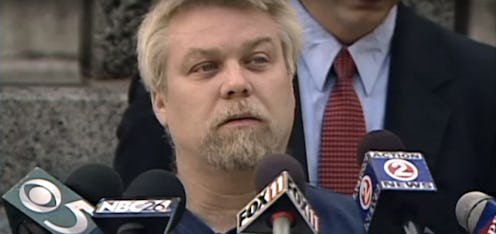News
Former Steven Avery Juror Speaks Out

The Internet has been aflame with conversation about Netflix's documentary series Making a Murderer and its central figure, Steven Avery, who was tried and convicted of murder. Specifically, the series explores the 2005 murder of Wisconsin photographer Teresa Halbach, highlighting Avery's defense attorneys' allegations of misdeeds by the Manitowoc County Sheriff's office (which the office denies). And now, someone close to the matter is speaking up as well. A juror in Avery's trial claims that two of his fellow jurors had Manitowoc County ties.
The man in question, Richard Mahler, is actually shown in Making a Murderer. He was the juror who was replaced near the start of deliberations due to an unspecified medical emergency. According to People, Mahler's daughter was injured in a car accident, which forced him to depart from the jury just days before it decided on a verdict. But it's a decision he seemingly regrets all these years later, because he's come to believe that Avery was innocent and that the jury operated under a huge conflict of interest. He claims to People:
After the trial, I found out ... [one juror] was the father of a Manitowoc County Sheriff's deputy. Another juror, his wife works for the Manitowoc County Clerk's Office ... I thought to myself, they shouldn't have been on the jury. That was a conflict of interest.
The central claim of Avery's defense is based on seemingly suspicious forensic evidence, as well as county officials' alleged misdeeds in wrongly trying and incarcerating him for a violent rape in the 1980s. Avery's lawyers hold that officials in Manitowoc County had it out for him, and were desperate to see him convicted and discredited, which the county vehemently denies. When Halbach disappeared and Avery effectively became the police's sole suspect, he'd been pursuing a $36 million lawsuit against the county over his wrongful conviction.
These claims were aggressively denounced by the prosecution at the time, including former district attorney Ken Kratz, who's now speaking out against the documentary. Kratz has since seen disgrace, exposed and censured for making unethical sexual advances toward a domestic violence victim he was representing in 2010. He was suspended from practicing law for four months, although is now back to practicing law.
But the county was clearly aware of the appearance of a conflict of interest. That's made clear by early statements from law enforcement which insist that Manitowoc County would not be involved in the Avery investigation. But as Avery's attorneys Dean Strang and Jerry Buting highlighted during the trial, Manitowoc officials ended up being highly involved in sensitive aspects of the crime scene search.
As such, the notion that two of the jurors could've had family ties to Manitowoc County is startling in the extreme. Reports following Avery's conviction suggested that only three of the 11 jurors began deliberations wanting to convict him of murder, but ultimately, their side won out. Reporting from the Milwaukee Journal Sentinel during the trial corroborated this, stating that one of the jurors has a son who worked for the Manitowoc County Sheriff's Department, and another was married to someone who worked in the Manitowoc County clerk of courts office.
Mahler also told People about a concerning conversation he allegedly had with one of the sitting jurors after the trial had ended (the "when he was younger" comment likely refers to Avery's prior criminal history, having once burglarized a bar and, more worryingly, immolated a cat). Mahler's recall of the conversation is the only evidence that it actually happened.
... his statement was, 'Just think of all those things he did when he was younger.' I thought to myself, 'Are you serious?' This trial was supposed to be based on the evidence that was presented to us. You're telling us that you convicted him based on what he did when he was younger. I did a lot of bad things when I was younger. That doesn't mean I deserve to be locked up for life.
Avery is currently serving a life sentence without possibility of parole. His nephew, Brenden Dassey, a developmentally challenged teen at the time of his trial and perhaps the most tragic figure (outside of Halbach herself) appearing in Making a Murderer, is also in prison for the murder, and won't be eligible for parole until 2048.
Image: Netflix